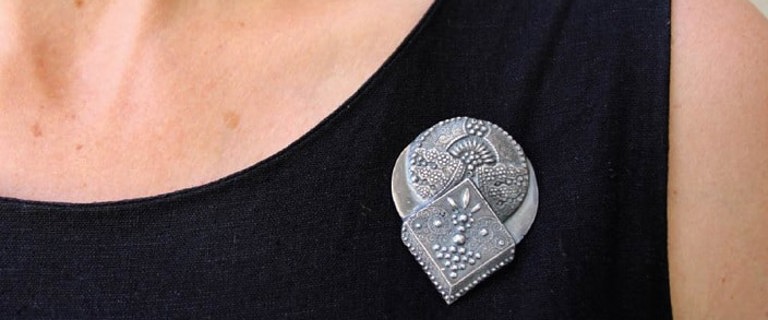Wearable Device Supports Early Intervention Against Loneliness

Bolton Clarke has won further recognition for aged care innovation, this time for wearable technology to tackle social isolation and loneliness.
The wearable CaT Pin (Conversation as Therapy pin), which uses number of words spoken in a day as a measure for social isolation, has won the $10,000 Designing for Ageing Well Challenge, co-sponsored by Telstra and RMIT to reward innovative thinking in design for Australia’s ageing community.
The design was created in conjunction with Matiu Bush, Senior Strategist in Business Innovation with Bolton Clarke along with Leah Heiss, Lecturer in RMIT’s School of Design, considered Australia’s pre-eminent designer of wearable technology. Associate Professor Paul Beckett from the School of Engineering and Emma Luke from the School of Design also formed part of the team.
The $10,000 prize will support further development of the working prototype and planned trials as part of a co-design process with older people and their families.
Mr Bush said there was an increased preference among older people to live and receive support at home, however research showed older people who experienced extreme loneliness were at risk of health consequences including disrupted sleep, elevated blood pressure, increases in the stress hormone cortisol, altered immunity and increased depression.
A contributing factor to loneliness is a lack of social interaction, with people who live in a conversation-rich environment speaking 7000-20,000 words per day.
“Elderly people living alone in the community have fewer opportunities for conversation and social interaction,” Mr Bush said.
“Often the only engagement older people living alone have is the 30 minutes with a community nurse or care worker who may visit them for specific services.
“Being able to monitor the number of spoken words in a day can provide a surrogate marker for potential loneliness and alert service providers to the need for a call or visit.
“The CaT Pin records the number of words spoken by the wearer and correlates this with a baseline figure for healthy interaction rates. When the wearer drops below a certain number of words over a given time a text message will be sent to a loved one, volunteer phone service or health care worker.”
The next step after trials will be mass customisation to be able to produce a considerable number of the low cost wearable pins.
This involves modelling each pin on an individual client’s personal artefacts and items such as medals, lace or jewellery, creating an item the client feels comfortable to wear and use.
“We are thrilled we can now enter into a production phase of this project, thanks to this win,” Mr Bush said.
“Being able to address loneliness will provide a better quality of life for our aging population, and we know loneliness is manifested in a poverty of conversation.”

